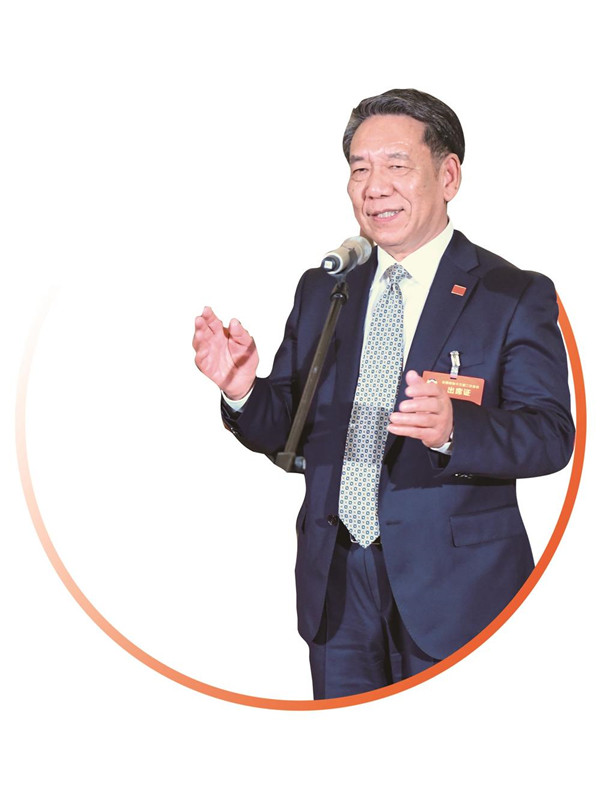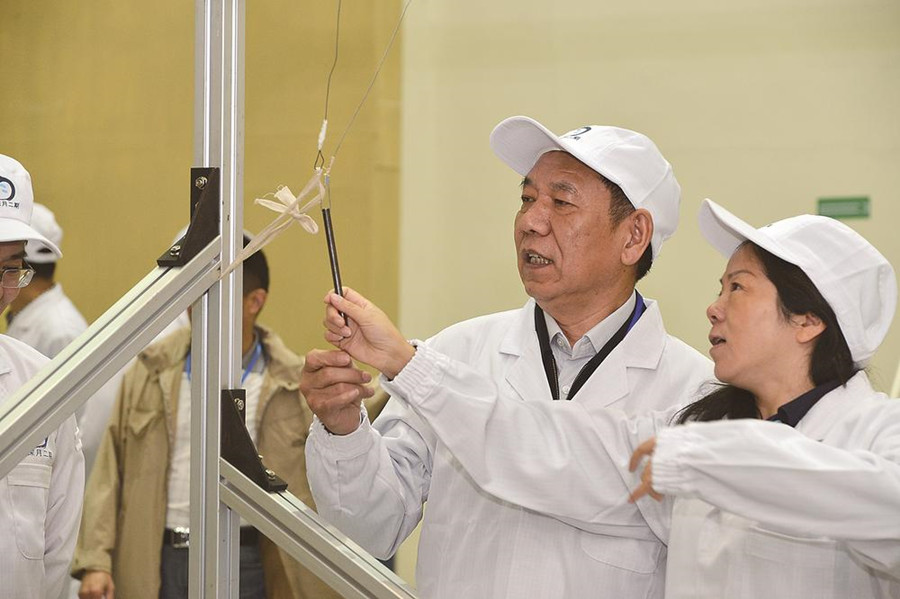Wu Weiren: Chasing dream of deep space

Wu Weiren is a member of the Standing Committee of the 13th National Committee of the Chinese People's Political Consultative Conference (CPPCC), a member of the Committee on Education, Science, Health and Sports of the CPPCC National Committee, an academician of the Chinese Academy of Engineering, chief designer of China's lunar exploration program, and director and chief scientist of the deep space exploration laboratory. [Photo provided to cppcc.gov.cn]

Wu Weiren works at the test workshop for the Chang'e 3 mission at the Xichang Satellite Launch Center, in Southwest China's Sichuan province. [Photo provided to cppcc.gov.cn]
On Sep 8, 2020, the asteroid nomenclature commission of the International Astronomical Union (IAU) approved for the international permanent number No 281880 asteroid to be officially named as "Wu Weiren Star".
On Jan 17, as a member of the Standing Committee of the 13th National Committee of the Chinese People's Political Consultative Conference (CPPCC), Wu Weiren won the 2022 outstanding performance award of members of the CPPCC National Committee, which is not only a recognition of his five years of service as a CPPCC member, but also praise for his contributions to China's aerospace sector.
In August 2008, at the age of 55, Wu was appointed the chief designer of China's lunar exploration program. Since then, he has led his team to achieve many "firsts" in the world.
On Jan 3, 2009, the Chang'e 4 probe successfully made a soft landing on the far side of the moon, which was the first time in human history, and carried out a patrol and survey. It was also the first time to realize relay communication between the far side of the moon and the Earth and to implement significant international cooperation with multiple countries and international organizations.
In December 2020, the overall technical plan for Chang'e-5 lunar sample-return mission, led by Wu, was successfully completed, gathering 1.7 kilogram of lunar soil and having great international influence. The work made a remarkable contribution to the building of a community with a shared future for mankind by peacefully using outer space.
Because of these contributions, Wu and his team have won many honors.
Completion of the Chang'e 4 mission made Wu the first person-in-charge to win the national science and technology progress award's special award. He was also the winner of the Qian Xuesen Highest Achievement Award.
In April 2020, Wu won the highest award of the IAF World Space Award, which was the first time for the federation to give the award to a Chinese space scientist in its 70-year history. The Chang'e 4 mission team, with Wu as the chief person-in-charge, was awarded the only team gold medal of 2019 by the Royal Aeronautical Society, which was also the first time for the society to award this medal to a Chinese program since it was established 153 years ago.
Considering Wu's significant contributions to human space exploration, the IAU's asteroid nomenclature committee approved the international permanent number No 281880 asteroid to be officially named as "Wu Weiren Star".
China has developed the implementation plan for the fourth stage of its lunar exploration program that presided over by Wu, including the Chang'e 6, Chang'e 7 and Chang'e 8 projects.
The Chang'e 6 mission is intended to "collect samples from the far side of the moon and bring them back to Earth, aiming to achieve a goal of 2,000 grams. Chang'e 7 is going to land on the moon's South Pole and will conduct a flyover to search for water, and Chang'e-8, to be launched around 2028, will form the basis of a scientific research station at the moon's South Pole with Chang'e 7, said Wu.
Exploring deep space
On April 24, 2022, China officially announced to build a defense system against near-Earth asteroids in order to protect the Earth from asteroids that may pose a threat to the planet.
During the two sessions in 2021, Wu put forward a proposal on the establishment of a national laboratory for deep space exploration to provide strategic scientific and technological support for seizing the fifth territory.
He suggested that the country should set up a national laboratory for deep space exploration, providing strategic support for the construction of a world power in science and technology.
In the following two years, Wu organized and carried out discussions and consultations for the lab with provincial regions including Beijing, Anhui, Jiangsu and Guangdong, and the Hong Kong and Macao special administrative regions.
In June 2022, the China National Space Administration (CNSA), Anhui Provincial People's Government and the University of Science and Technology of China jointly launched a deep space exploration laboratory.
Wu was appointed the director and chief scientist of the laboratory.
The laboratory intends to gather talents to tackle strategic, prospective and basic technological challenges, supporting the implementation of major national deep space exploration projects.
"Deep space exploration is a response to unknown space challenges, which will explore the unknown world for human well-being," Wu added.
Making the country top priority
In March 2018, Wu became a member of the Standing Committee of the 13th CPPCC National Committee and the head of the 31st group of CPPCC members in the science and technology circle.
"Being a CPPCC member is a special identity and character. We should fulfill our responsibilities and do our best for the nation and the people. For what is of vital importance to the nation, we have great responsibility," Wu added.
"CPPCC members participating in group discussions is not only a process of giving suggestions on Sate affairs, but also a process of building consensus. Members in the science and technology circle sharing their ideas help broaden our vision and field, enabling us to solve relevant problems more quickly," Wu said.
Over the course of five years, Wu submitted 15 proposals on enhancing the construction of soft power in outer space, and strengthening space biotechnology and safety research. Many proposals have been highly valued by State leaders and relevant ministries, and some suggestions have been adopted and implemented.
During the First Session of the 13th CPPCC National Committee in 2018, Wu put forward three proposals as the first proposer. One of the proposals suggested the country launch the fourth stage of the lunar exploration program as soon as possible.
In 2020, Wu, together with eight other CPPCC members, put forward a proposal on improving the capacity of space governance and enhancing the international voice as an important part of the modernization of national governance. Wu organized academicians and experts in relevant fields to systematically solve the severe challenges and outstanding problems faced by China's current governance of space activities, providing suggestions from the four sectors of organization management, laws and regulations, international cooperation and supporting technologies.
Through in-depth surveys, Wu also wrote a relevant study report on vigorously promoting the high-quality development of the high-end equipment manufacturing industry, which won high praise and support from relevant industries.
Spreading the seeds of science
As an academician of the Chinese Academy of Engineering, Wu has given more than 40 science lectures in five years.
"Today's science and technology is undergoing rapid development. The popularization of science is no longer just about spreading and interpreting traditional scientific knowledge, but publicizing cutting-edge scientific knowledge and achievements in a timely manner, cultivating scientific literacy and spreading scientific culture. As a space worker, I am willing to inspire young people's patriotic enthusiasm and the spirit of exploration, encouraging them to dedicate themselves to China's technology and space sectors," Wu said.
Wu said that he believes that being innovation-driven is essentially talent-driven. Talent is the key to independent innovation.
Wu has been paying great attention to the training of talents in the aerospace sector, especially in the cultivation of teenagers.
He donated his award money of 2 million yuan ($291,600) to the University of Science and Technology of China and Pingchang Middle School in Sichuan province, encouraging students to strive for China's future.
Passing down the spirit of exploration
In July 2021, the School of Future Aerospace Technology of Beihang University was established. Wu was appointed the first president of the school. The school aims to cultivate leading talents in aerospace technology based on national major strategies and social development needs.
Wu suggested that one of the major goals of the deep space exploration laboratory is to cultivate talents for deep space exploration.
In the past five years, as a CPPCC member, Wu has carried out many surveys at the grassroots level.
"I gained a lot from my surveys. I deeply felt that our country is paying more and more attention to the development of cutting-edge science and technology. In the future, we have the responsibility to focus on our national science and technology strategy development and decision-making direction," he said.
Copyright © The National Committee of the Chinese People's Political Consultative Conference.
All rights reserved. Presented by China Daily.
京ICP备08100501号-1

